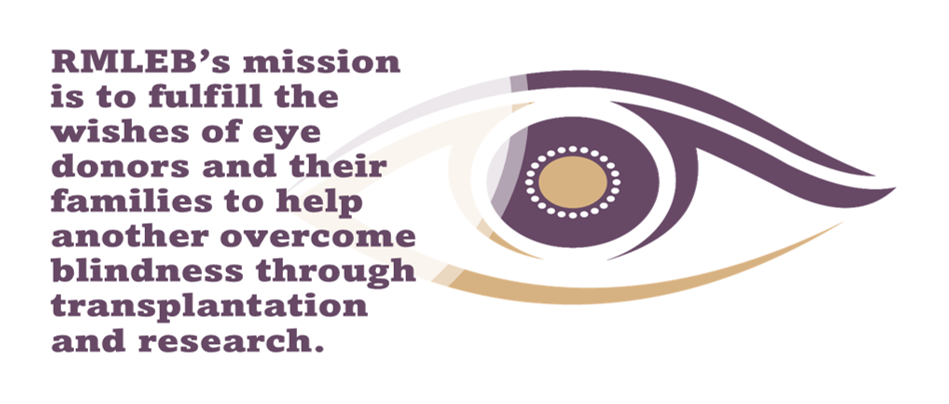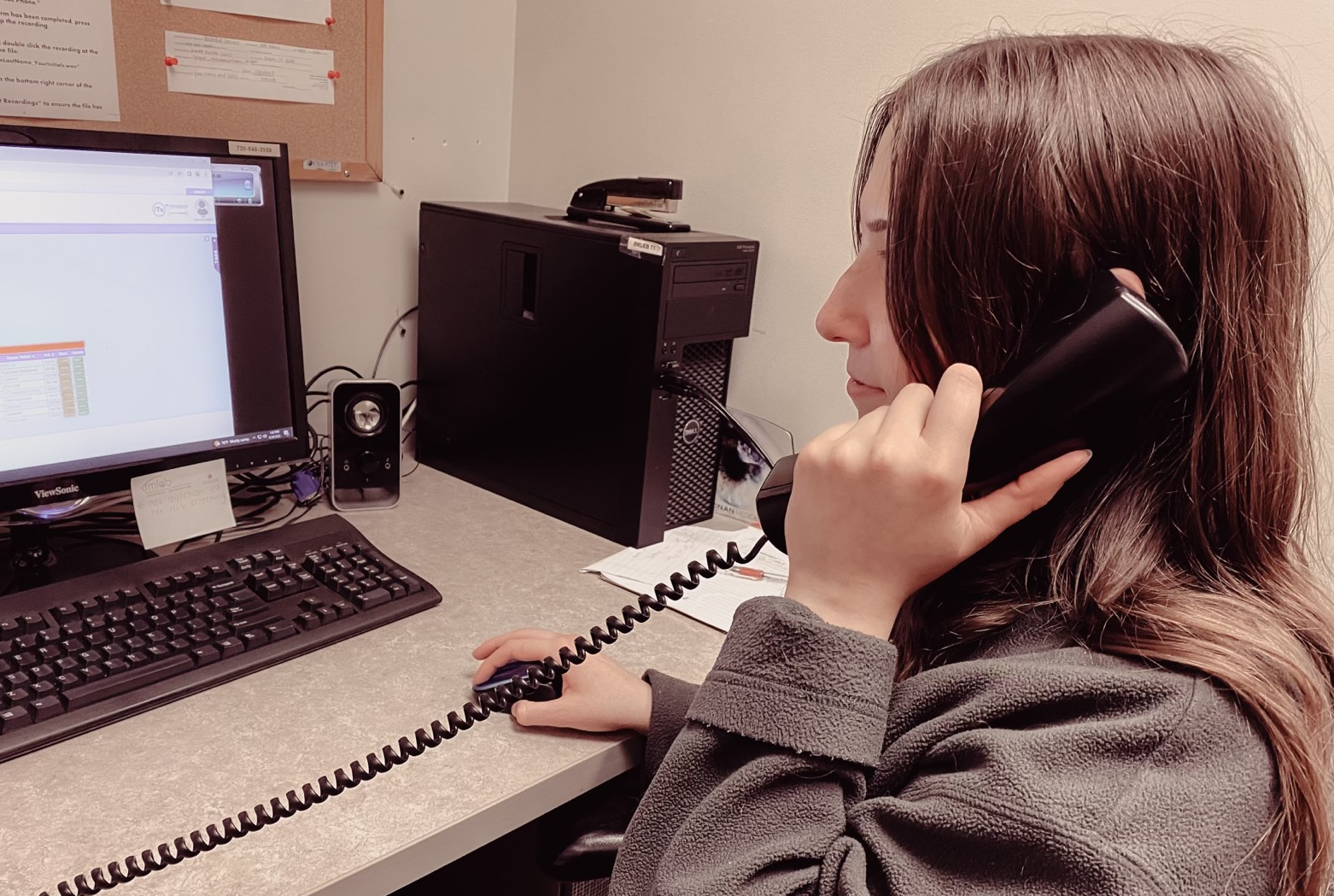Personal Connections and Communicating with Confidence
A Day in the Life of Paige, RMLEB Lead Donor Recovery Coordinator
By Kerry Halladay - July 3, 2023
When Paige Stockard started with the Rocky Mountain Lions Eye Bank, she never thought her favorite part of her job would be talking to people. In fact, it was the thing she was most afraid of when she started. Now it’s one of her favorite parts of her job as a donor recovery coordinator lead.
“I never would have expected I would be good at talking to people,” she said. “I did not think I was going to be able to do that coming into this job, so it being one of my favorite things now is one of the things that I am most grateful for learning.”
As a lead donor recovery coordinator, Paige is part of the Rocky Mountain Lions Eye Bank (RMLEB) technical team. This team manages the hands-on work that makes what we do possible. Members of the technical team recover eye tissues from deceased donors at the beginning of the donation process. At the other end, they also prepare tissue for surgeons’ individual transplant needs and ensure it makes it to its destination.
Between these two ends of the donation process, technical coordinators oversee everything. Donation is a process with a ticking clock. Ideally, corneas should be recovered within 8 hours after a donor has died. Once recovered, an eligible tissue must be placed with a surgeon within 14 days. This means coordinators are interacting with donors’ next of kin, hospital staff, coroners, funeral directors, surgeons, transport and shipping personnel, and everyone between donor and recipient to ensure the donor’s gift of sight is honored.

The mission statement of the Rocky Mountain Lions Eye Bank.
The technical team is integral to fulfilling the organization’s mission.
Paige came to this role for both professional and personal reasons. As a life-long lover of science, she plans to earn a master’s degree in genetic counseling. She wants to be able to empower others to make informed medical decisions and sees the work here as an excellent experience in pursuit of that goal.
But RMLEB wasn’t her introduction to the world of organ, eye, and tissue donation.
“I was also really drawn to the field of donation because my dad was actually a double lung recipient,” she said.
“I know that eyes are not the same as lungs, but just working in donation makes me feel connected with my dad. I feel like I’m able to say ‘thank you’ to my dad's donor. It's very fulfilling in that way.”
A Day in Paige’s Life
Paige’s work days start early. While her shift starts at 6 a.m., she often checks the team’s workflow interface — “the board” — right away to get a jump on helping donor families and her teammates each day.
The board shows potential donors from whom tissue needs to be recovered, next of kin and donor families who need to be approached and interviewed and other important logistics necessary to make the dynamic process of eye tissue donation safely happen. Paige said checking the board early helps mentally prepare for each day, where her duties as coordinator lead mean she needs to prioritize on the fly.
“When I come in, I always have to look at the board first just to get a sense of where we are for the day. From there, if we have a delivery, that’s the highest priority because we need to get the tissue to the surgery center as soon as possible.”
After coordinating those logistics, Paige’s next priority is getting blood samples ready for testing. RMLEB is overseen by the Food and Drug Administration (FDA). The FDA has strict health requirements to ensure donated tissue is safe to transplant. This includes reviewing the donor’s health history with the hospital, conducting a health behavioral interview with a next of kin, and running several levels of tests on blood samples from the donor and the tissues themselves. The blood screening is a very important step.
“For blood verification, that has to be a huge priority because our testing service comes and picks up blood from us between 6:30 and 7:00 (a.m.) every day,” Paige explained. Every morning, she examines all the blood samples ready to go out and verifies that all the information associated with them is complete and correct.
After those two time-sensitive morning priorities, Paige says each day is unique. She might need to drive to various Denver-area hospitals to recover eye tissues from deceased donors. Each recovery takes about an hour and lets her flex her surgical skills.
"Everything’s different every single day, so I just have to come in with an open mind..."
Or she might need to call families who’s loved one has died an hour before to ask them if they would consider donating their family member’s eye tissues, if the deceased is not on the donor registry. These calls can be very emotional for both Paige and the family, but they can result in so much good. An agreement to donate means the potential of sight for someone living with corneal blindness and the potential of some solace for those grieving.
Or Paige might need to call the next of kin of a donor from whom eye tissues have already been recovered. These DRAIs — donor risk assessment interviews — are part of the process to ensure the eye tissues are safe for transplant. These calls can take over a half hour and cover some rather personal details about the donor’s life.
Between these big tasks, Paige and the rest of her team are coordinating with everyone involved in donation. There are a lot of phone calls to make, a lot of updating and verifying information to do, and it needs to happen quickly and accurately.
As a coordination lead, Paige also finds herself training and advising newer members of the technical team. All this creates a flexible, unique work environment that she loves.
“Everything’s different every single day, so I just have to come in with an open mind and know I’m not just going to sit behind my computer,” Paige said. “I feel like there are so many different things that keep me engaged. I never get bored, which is great.”
The Personal Connection
Dealing with death and the grief of those who remain in the very hands-on, personal way that recovery techs and their coordinators do every day can be an emotional job. It’s not for everyone, but Paige says she has come to enjoy the human side of the work.
“Some people don’t like this, but I really, really enjoy when I talk to a family and make a connection with them. When I go over the medical history with them and they are really supportive. And I really like following through and doing that recovery as well,” Paige explained. She noted that not everyone who does this work is comfortable getting close to the donor by talking to their family then doing the recovery.
“It can feel like too much,” she acknowledged. “But, I actually really value that personal connection with the donor. So, I really like situations like that where I get to talk to the family and also do the recovery.”
Growth Through Experiences
Paige has learned a lot about people in her work at RMLEB.
Different people grieve differently, for instance. After a loved one dies, there can be a sense of loss of control or power. For some people, when someone like Paige calls them to ask if their loved one would have wanted to donate their eye tissue, taking a stance of opposition is a way to reclaim that lost empowerment. For others, agreeing to donation is a way to do one last thing for their loved one and find comfort in knowing part of them will help another. Both are valid ways to grieve and approach the question of donation.
“I feel like I understand more about other people and myself and being able to communicate with families during such a hard period in their life,” she said.
But Paige hasn’t only learned about other people in her role at RMLEB. Since she started in March 2022 as a donor recovery coordinator and was promoted to the lead position, she’s also learned quite a bit about herself.
“I've definitely built up a lot of confidence over the last year working here,” she said. She used to be super shy and reserved, especially in her childhood when her social anxiety meant she “wouldn’t even pick up the phone for anyone.” But Paige started improving her communication skills at a previous job working with autistic kids.
“But this job has truly made me grow in so many ways,” she observed.
“It’s definitely shown me that stepping outside of my comfort zone can be very, very beneficial.”

